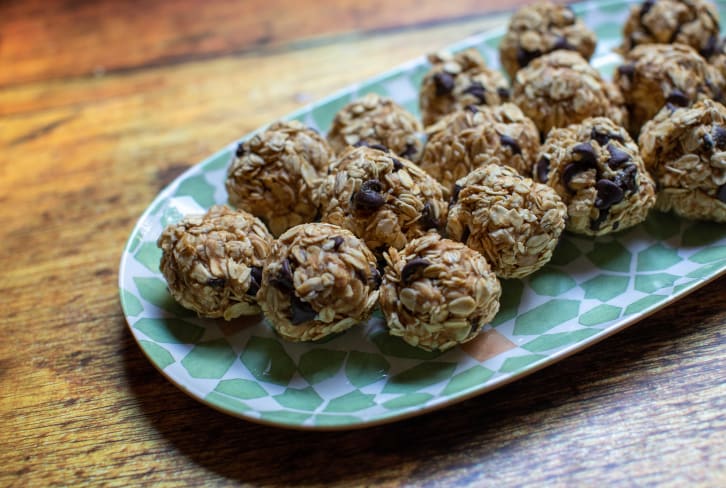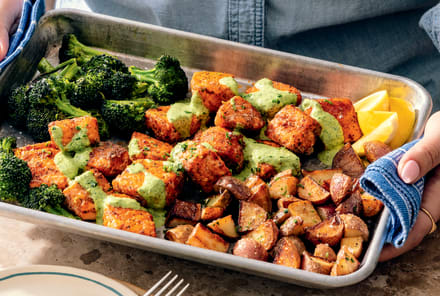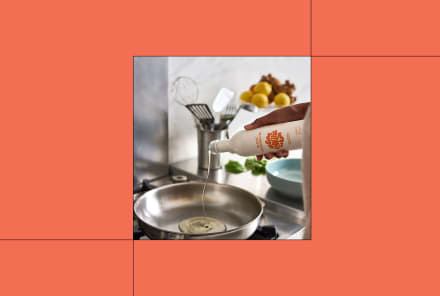Advertisement
I Tried Everything To Heal My Gut. These Are The 6 Things That Actually Made A Difference

You'll try meditating. You'll try weird stuff, like silver-woven horse blankets ('cause it's supposed to be healing) and Himalayan salt inhalers ('cause maybe that will be the solution). You'll go to osteopaths, ask all your friends for their acupuncturists, and request your GP to recommend you to another gastroenterologist because the first one didn't give you any real answers.
I know this story well because it was mine.
I was formerly sick. Not the lying-in-a-hospital-bed-for-days kind of sick where everyone can see that you are genuinely ill but the type you can’t witness. Instead, my immune system was ultra weak, I was forever exhausted, and I lived with chronic inflammation. Headaches, brain fog, stomach pains, and crazy bowels were my constant. Plus, the forever-acned face, vitamin deficiencies (no matter how much iron I took) were endless, and my stomach was so bloated that strangers asked if I was pregnant. And yes, doctors asked me to do a pregnancy test, like, five times. Face-palm emoji.
I was brushed off by Western medicine because symptoms like headaches, constipation, and stomach pain are difficult to diagnose and after a while, they said, "There is nothing you can do."
So, I said, "Hell no," rolled up my denim sleeves, and did it myself. I used myself as a guinea pig to test every strategy to heal my digestive disorders. I played with everything from private health care treatments to red reishi mushroom supplements to New Age healers. After years of searching, I discovered I had an autoimmune disease (celiac disease), leaky gut, IBS, Candida, and handfuls of allergies and sensitivities.
Because autoimmune diseases never go away (you simply manage them until you’re functional), it's about turning off the triggers. Major triggers include a poor diet, food allergies and sensitivities, toxins, antibiotics, synthetic drugs, and stress. When you have these triggers in your life, you feel all the symptoms and flare-ups.
The same thing goes for your gut. The lining is designed to keep microbes, toxins, and undigested food inside the GI tract. So, when it crumbles from a poor diet, too much stress, antibiotics, or toxins, the sewage releases. Then, your immune system aggressively attacks the pathogens, causing inflammation. You want the microbes that live in your gut (bacteria, archaea, viruses, fungi, etc.) to be diverse because 70 percent1 of the immune system dwells there, and you need it to protect you when the light switches are on.
After years of experimentation, my symptoms finally began to go away. From the hundreds of experiments I performed over more than 10 years, here's what actually worked:
1. Turning to functional medicine.
It looks at the entire body to find the root cause of your disease and treats it as one, not unattached symptoms. When I heard about this, I was like: "Whoa, these doctors get it."
2. Building a kick-ass, unwavering mindset toward healing.
To change your body, you need to change your mind. For me, I needed to relinquish my self-limiting beliefs, fixed ways of being, and learn that I was worthy of healing. Mastering your mind is an act of self-love because your inner critic will rear its ugly head when you’re snacking on goat cheese canapés at the company dinner and think, "I’m a fat, sick, ugly slob who can never get anything right." (Boy, did I say that one a lot). By building a stronger mindset, you’re changing your brain with a process called self-directed neuroplasticity. As Dr. Rick Hanson, a neuroscientist with a focus on happiness, puts it, "The brain takes its shape from what the mind rests upon," so, if you do the mental work first, you’ll meet life changes with less resistance and more resilience.
3. Opting for an anti-inflammatory diet.
Like me, you've probably tried an insane diet and the latest superfood supplement. What changed my game was a plant-based, gluten-free, low-sugar diet. Essentially, I eat whole, unprocessed, nutrient-dense foods like vegetables, fruits, nuts, seeds, legumes, beans, gluten-free grains, and good fats. As a person with chronic fatigue, I couldn’t spend any more of my life "sleeping off a meal," and it turns out that plants give me more energy than meat.
Finally, I gave food allergies and sensitivities the boot. You get inflammation from both, and sensitivities are trickier because they leave you feeling "off." For example, I feel terrible after I eat corn because my body considers corn an invader and releases IgG antibodies to attack it.
4. Choosing nontoxic products.
Everybody has a toxic load threshold. Imagine a cup of water. The more chemicals you inhale from your phthalate-filled fragrance or absorb from your paraben-filled lotion, the more the water rises. Once you’ve hit the brim, it overflows, the immune system attacks the synthetic invaders, and inflammation occurs.
Synthetic chemicals (xenobiotics) are scientifically proven3 to lead a role in the "initiation or progression of autoimmune conditions." So, I swapped everything synthetic—my detergent, mascara, and tampons—for clean products listed on the EWG’s database.
5. Avoiding nonessential antibiotics and synthetic drugs.
I overused antibiotics in the past for noncritical problems (like acne and athlete's foot); at one point, I was on them for 12 consecutive months. They left me sicker than ever. That’s because antibiotics, steroids, over-the-counter meds, and anti-inflammatory drugs like aspirin and ibuprofen can break down the gut lining and compromise the mucosal barrier.
Antibiotics cause a microbial imbalance and wipe out good microbes like bifidobacteria bifidum and lactobacillus acidophilus (which is stuff you’re popping in your daily probiotic pill). This study states that "a single antibiotic treatment in healthy individuals contributes to the risk of resistance development and leads to long-lasting detrimental shifts in the gut microbiome."
I'm not saying avoid antibiotics completely—I'm saying that when it comes to drugs, it makes sense to choose wisely and use them for the essentials.
6. Genuinely manage stress.
When I get super stressed out, my triggers spike, and I usually get sick. That’s because stress causes dysfunction in the intestinal barrier. This study shared that stressed-out people have an "enhanced uptake of potentially noxious material, like antigens, toxins, and other pro-inflammatory molecules, from the gut lumen." If you're uptaking more toxic materials, you become more inflamed and begin to suffer more symptoms of autoimmunity.
Also, lower stress hormones equate to a more diverse microbiome, according to this research, so I practice daily gratitude, take proper breaks to lie down, and acknowledge my emotions when they come up versus shoving them away. Plus, I exercise daily to physically release and shift my mind because forced exercise (versus voluntary) is linked to stronger immune function.
These eight foods helped a top chef get a handle on his autoimmune disease. Plus, how to make turmeric an even more powerful inflammation fighter.
Watch Next
Enjoy some of our favorite clips from classes
Enjoy some of our favorite clips from classes
What Is Meditation?
Mindfulness/Spirituality | Light Watkins
Box Breathing
Mindfulness/Spirituality | Gwen Dittmar
What Breathwork Can Address
Mindfulness/Spirituality | Gwen Dittmar
The 8 Limbs of Yoga - What is Asana?
Yoga | Caley Alyssa
Two Standing Postures to Open Up Tight Hips
Yoga | Caley Alyssa
How Plants Can Optimize Athletic Performance
Nutrition | Rich Roll
What to Eat Before a Workout
Nutrition | Rich Roll
How Ayurveda Helps Us Navigate Modern Life
Nutrition | Sahara Rose
Messages About Love & Relationships
Love & Relationships | Esther Perel
Love Languages
Love & Relationships | Esther Perel
What Is Meditation?
Box Breathing
What Breathwork Can Address
The 8 Limbs of Yoga - What is Asana?
Two Standing Postures to Open Up Tight Hips
How Plants Can Optimize Athletic Performance
What to Eat Before a Workout
How Ayurveda Helps Us Navigate Modern Life
Messages About Love & Relationships
Love Languages
Advertisement

These Peanut Butter Cup Protein Bites Make The Perfect On-The-Go Snack
Molly Knudsen, M.S., RDN











